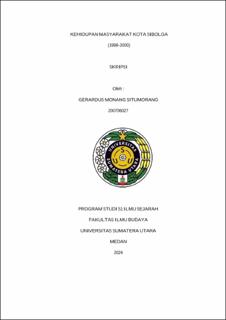| dc.description.abstract | Research on the Life of the Sibolga City Community (1998-2000) is a historical study during the transition from the New Order to Reformation. This study aims to answer several problem formulations regarding the economic conditions of the community before the crisis occurred, community survival strategies and the impact of the crisis on the community's economy. This study uses a qualitative research type and uses historical method research, 4 stages, namely heuristics, verification, interpretation, and historiography.In the heuristic stage, the data used consisted of primary data and secondary data. Primary data is obtained from interviews with people who lived contemporarily as well as books published contemporarily, and secondary data is taken from newspapers, journals, theses, books that explain the conditions after the crisis occurred. After the data has been collected and verified, then proceed to the interpretation stage, and continued to the last stage, namely histiography. The results show that the lives of the people of Sibolga city in 1998-2000 experienced changes, especially in their economic conditions. Initially, their lives went smoothly so that there was no significant r.eaction. But slowly the impact of the crisis began to be felt by the community. This can be seen when the price of goods begins to rise slowly, causing people to be unable to fulfill their own needs. The government's efforts in overcoming this problem by providing some assistance both basic material assistance and education assistance for those who are less capable. While the community's efforts to stay afloat by increasing their work and looking for money loans to other communities | en_US |


